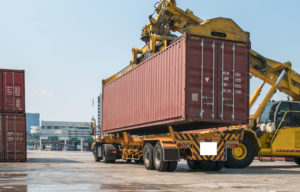News & Insights
New Developments in the Section 232 Tariffs on Imports of Steel and Aluminum Products
The last two weeks ushered in several significant developments relating to the increased tariffs under Section 232 on certain steel and aluminum products. U.S. importers and manufacturers of affected products, raw materials, parts and components should take note of the following key developments and new import filing requirements—
- A Presidential Proclamation under Section 232 of the Trade Act of 1974 was issued providing for an absolute quota on certain South Korean-originating steel mill articles imported into the United States on or after May 1, 2018. Covered products are those classified in Harmonized Tariff Schedule of the United States (“HTSUS”) subheadings 9903.80.05 through 9903.80.58. The established quota period initially runs from January 1, 2018 through December 31, 2018 and may be extended for additional annual periods. Absolute quota merchandise may not be imported into the U.S. for consumption after the established quota limit is reached. The quota limit for some of the steel mill products has already been reached for 2018. Options for importers after the quota limit is reached include warehouse, foreign trade zone, exportation or destruction.
- A Presidential Proclamation was issued stating that Argentina, Australia and Brazil will remain exempt from the additional Section 232 tariffs on certain aluminum and steel products and no expiration date for that exemption has been established. The exemption established for Canada, Mexico and the EU are set to expire on May 31, 2018—the U.S. is continuing discussions with those countries.
- Because an absolute quota was established for imports of South Korean-originating steel mill articles, importers must enter these goods under quota entry types 02, 06, 07, 23, 32 or 38. For imports of aluminum and steel products from all other countries, importers should continue to use non-quota entry type codes.
- For steel products, importers must report their regular Chapters 72 and 73 HTSUS classifications as well as HTSUS Subheading 9903.80.01.
- For aluminum products, importers must report their regular Chapter 76 HTSUS classifications as well as HTSUS Subheading 9903.85.01.
- Aluminum and steel products that are subject to increased Section 232 duties are not eligible for preferential tariff treatment under the Generalized System of Preferences (“GSP”) or the Africa Growth and Opportunity Act (“AGOA”). Importers should pay the normal trade relations (Column 1) duty rates on such items and should not submit the GSP Special Program Indicator (SPI) “A” or the AGOA SPI “D.” (Note that Brazil and Argentina are exempt from Section 232 and importers may still make claims under the GSP and AGOA for eligible aluminum and steel products.)
- Trade preference claims under all other Free Trade Agreements (“FTAs”) and special trade programs may be made for steel and aluminum products that are subject to Section 232; however, Section 232 duties must be paid on those imports even if trade preferences apply.
- Imports subject to the increased tariffs that are imported under HTSUS subheading 9802.00.60 will be assessed Section 232 duties based upon the full value of the imported article.
- With respect to foreign trade zones (“FTZs”), any steel or aluminum article subject to Section 232 duties (except those eligible for admission under “domestic status”) that is admitted into U.S. FTZs on or after March 23, 2018, must be admitted as “privileged foreign status” and will be subject upon entry for consumption to any ad valorem rates of duty related to the classification under the applicable HTSUS subheading. In addition, any steel or aluminum article that is subject to Section 232 duties (again, except those eligible for admission under “domestic status”) that was admitted into U.S. FTZs under “privileged foreign status” before March 23, 2018, will be subject upon entry for consumption to any ad valorem rates of duty related to the classification under applicable HTSUS subheadings imposed by the Presidential Proclamations. Aluminum or steel articles shall not be subject upon entry for consumption to Section 232 duties merely by reason of manufacture in a U.S. FTZ; however, articles admitted to a U.S. FTZ in “privileged foreign status,” shall retain that status.
- Steel or aluminum articles covered by the additional Section 232 duties and quota may also be subject to antidumping and countervailing duties.
- No duty drawback claims may be made with respect to the Section 232 duties imposed on any aluminum or steel article.
See Quota Bulletin 18-118 and CSMS #18-000316 Quota Announcement South Korea Steel Mill Articles. See also CSMS# 18-000317 Update: Additional Duty on Imports of Steel and Aluminum Articles under Section 232.
As we have previously reported, the Trump Administration imposed additional tariffs on imports of certain steel and aluminum products for national security reasons because of an investigation conducted by the Commerce Department’s Bureau of Industry and Security (“BIS”) under Section 232 of the Trade Expansion Act of 1962 (19 U.S.C. Ch. 7). The BIS found that U.S. steel imports quadrupled U.S. exports and aluminum imports had increased to 90% of the total demand for primary aluminum. Accordingly, the BIS concluded that the quantities and circumstances of steel and aluminum imports threaten to impair U.S. national security, and recommended that the President act to protect the long-term viability of the U.S. steel and aluminum industries. The President issued Proclamations on March 8, 2018, announcing increases in import tariffs on certain aluminum and steel products.
The increased tariffs, which went into effect on March 23, 2018, apply to products originating in all countries—except for those countries that are specifically exempted as noted above. Affected steel products include goods classified in HTSUS Subheading 7206.10 – 7216.50, 7216.99 – 7301.10, 7302.10, 7302.40 – 7302.90 and 7304.11 – 7306.90. Affected aluminum products include: unwrought aluminum in HTSUS Heading 7601; aluminum bars, rods and profiles in Heading 7604; aluminum wire in Heading 7605; aluminum plate, sheet, strip and foil in Headings 7608 – 7609; and, aluminum castings and forgings in HTSUS Subheadings 7616.99.5160 and 7616.99.5170.
Aluminum and steel products that are not produced in the U.S. in a sufficient and reasonably available amount or in a satisfactory quality will be excluded from the increased tariffs upon request. Products may also be excluded from the increased tariffs based on national security reasons. U.S. companies still have time to submit formal requests to the Commerce Department’s Bureau of Industry and Security (“BIS”) until May 18, 2018 to formally request an exclusion from the increased tariffs. Companies that are suppliers of these items in the United States or that use them in the United States in construction and manufacturing operations are eligible to submit such requests. In addition, companies in the United states may also file objections to the requests for exclusions under the announced process.
As with all things international trade-related, it is crucial for affected U.S. companies to stay up-to-date on any new Section 232 developments to ensure that they have sufficient lead time to adapt to changes that will impact their international supply chains. If you have any questions pertaining to the increased Section 232 tariffs on aluminum and steel products, entry requirements for articles that are subject to Section 232 or other international trade issues, contact Melissa Proctor at Miller Proctor Law PLLC (melissa@millerproctorlaw.com).
News & Insights

Are You Ready for Incoterms 2020?
The International Chamber of Commerce (“ICC”) periodically publishes trade terms for domestic and international use in business contracts for the sale and purchase of goods. They are updated approximately every 10 years. The last revision was issued in 2010, and

U.S. Export Restrictions on Huawei: Timeline of Events and Latest Updates
Many questions have been swirling around as of late as to the current status of U.S. export restrictions on Huawei following President Trump’s comments at the G-20 summit. The following provides a timeline of events and an update on the


